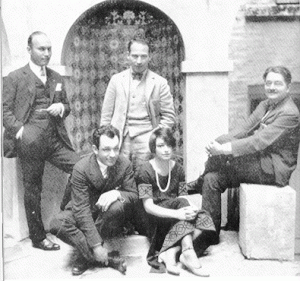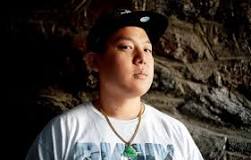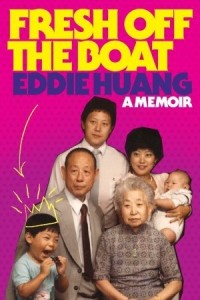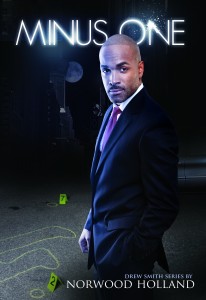Tips on developing your networking strategy
June 27, 2013

Circa 1919—the famed Algonquin Round Table with members Harpo Marx, Art Samuels, Alexander Woolcott, Charlie MacArthur, and Dorothy Parker. (Tumblr)
When asked to use the word horticulture during a game of Can-You-Give-Me-A-Sentence, Dorothy Parker replied: “You can lead a horticulture, but you can’t make her think.” Known for her caustic quick wit Dorothy Parker was a founding member of The Algonquin Round Table, the 20th Century’s most powerful and prolific literary network. It was a veritable nucleus of intellectual energy. At its core were founding members Vanity Fair writers Dorothy Parker, Robert Benchley and Robert Sherwood. It started as a casual lunch group meeting daily in the Algonquin Hotel’s Rose Room and grew to include a host of writers and critics including Edna Ferber, George S. Kauffman, Heyward Broun, Mark Connelly, and Donald Ogden Stewart among others. Society columnists coined the name The Algonquin Round Table and the group did what networks usually do: exchange gossip, ideas, trends, information on jobs and writing assignments from New York to Hollywood.
Round tables are traditionally about connections serving as educational and networking tools. It’s not necessary to join a roundtable to network effectively. The easiest way to tap into a professional network is by actively attending conferences and rubbing elbows with the industry professionals, movers and shakers.
Networking can establish relationships that open doors with information and education. Always sign up for a conference with a particular goal or purpose in mind. Consider it an opportunity to meet new people who can give you new leads opening up new possibilities. Think about what it is you plan to accomplish or take away–and above all–sharpen your networking skills.
In developing your networking strategy remember the Boy Scout motto: Be Prepared. Do your homework by researching those who will be presenting at the conference. When the opportunity presents itself make your presence known. Armed with certain background information you will be surprised how the conversation will flow. Research the presenters and panelists who will be discussing the topics relating to your interest. Consider introducing yourself with an advance email to the particular presenters and practice your introduction.
Have an elevator speech ready encapsulating your background and goals in making your acquaintance. Get to the point quickly and try to be engaging by showing interest with eye contact. Have your business card updated with your email and contact particulars. The business card lays the groundwork for the follow up and a long term connection.
Don’t forget to mind your manners. After your gracious introduction know when to excuse yourself and walk away. Be considerate. Nothing is worse that standing waiting your turn to introduce and speak with a presenter only to have another greedy attendee monopolize the Q&A time. Be courteous and considerate of the time of the presenter and the other conference attendees. If you cannot get to the presenter try to speak with an event organizer, a team member or their publicist if one is present. They too can prove to be vital connections. Remember, it’s about building relationships.
Above all, ask questions and don’t push your products or run your mouth a mile a minute. Prepare a couple of questions in advance and be prepared to listen. Be honest in your approach and don’t be pretentious by name dropping or inflating your background.
You don’t have to be as charming and as witty as Dorothy Parker or belong to a roundtable, but do have some culture. Enjoy yourself meeting, greeting and making new connections. Moreover nurturing those new connections can help in building your business and your brand going forward.
Eddie Huang’s hip hop memoir ‘Fresh Off The Boat’
June 3, 2013
Coming out of the hip hop generation Fresh of the Boat is probably the best recent memoir written. When it comes to destroying the model minority myth and Asian stereotypes look to Eddie Huang. How he managed to compress so much wisdom in 20 some years of living before rising to the heights of celebrity chef is a remarkable story. Chronicling his intellectual and professional growth Huang narrates his iconoclastic life through the prism of hip hop music and good food all the while struggling against American racism with an added zesty taste for life. Coming of age then and thereafter whatever path he chose he did so bypassing conventional behavior. He’s a rebel, a maverick and a nonconformist. Whatever you call it, homeboy played by his rules.
A first generation Chinese-American he spent his early childhood in Washington DC before his immigrant father settled the family in Florida. Eddie was a gifted rebellious child and for good cause. Coping with a dysfunctional family while classmates called him chigger and chink, this one was no Uncle Chan but a warrior standing up addressing the struggle against racism. He defends his Chinese heritage as defined by the American experience with the same outrage and reasoned eloquence found in the writings of W.E.B. DuBois. Indeed he was weaned on DuBois, Booker T. Washington, Toni Morrison and other African American literary greats. His role models and heroes were a host of NBA players.
Eddie Huang’s focused discipline allowed him to accomplish whatever he set out to do. This character trait was forged either because of or in spite of a dysfunctional home, a temperamental mother and a former Taiwanese gangsta Dad. Most minority kids Black, Asian, Latino and others know how white kids –more so the privileged–can be particularly vicious in their racist taunts. Most looked the other way or dismiss it, but a few will step to the behavior with violence and that was Eddie Huang. His behavior was often frowned upon by his own people but Eddie didn’t care.
He was a honor student, an English major with felony record ending up at Cardoza School of Law. He secured an associate position in a New York law firm, while becoming a sideline streetwear mogul capitalizing on designing and marketing the trendy styles. Then the economy tanked the streetwear market floundered and the law firm laid him off. Despite the worst American society had to offer the immigrant minority Eddie Huang made the best of it reinventing himself as a celebrity Chef. Huang says, “I wasn’t meant to be an attorney, but I was meant to go to law school.” He would find his reason for being in food.
What stands out in Eddie Huang’s life is the confluence of hip hop, the cultural force of his generation, just as protest music was an indelible part of social fabric of the sixties and seventies. Huang goes so far as to compare and contrast contemporary lyrics with Shakespeare. Hip Hop influences language and fashion and his approach to food. Hip hop is no longer defined by Blacks although originating in inner city ghettos; it’s defining today’s youth.
“My entire life,” Huang writes, “the single most interesting thing to me is race in America. How something so stupid as skin or eyes or stinky Chinese lunch has such an impact on a person’s identity, there mental state, and the possibility of happiness. It was race. It was race. Apologies to Frank Sinatra, but I’ve been called a ch!gg@r , a puppet, a pauper, a pirate, a pawn, and a chink; that’s life. I am obsessed with what it means to be Chinese, thing the idea of America is cool, but at the end of the day wish the world had no lines. Like Michael Ondaatje writes, “All I ever wanted was a world with maps.”
Race has destroyed many a youthful ambition. Wouldn’t it be wonderful if those affected all had Eddie Huang’s wherewithal? Hip hop has done much to overcome the barriers of race. I highly recommend Fresh of the Boat.





